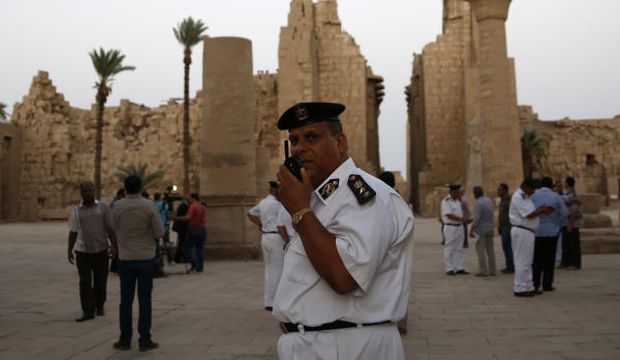
Egyptian security officials stand guard as tourists visit the ruins of the Karnak Temple in Luxor, Egypt, on June 10, 2015. (AP Photo/Hassan Ammar)
Cairo, Reuters—A suicide bomber blew himself up near the ancient Egyptian Karnak Temple in the southern city of Luxor on Wednesday, security sources said, a possible sign that Islamist militants are shifting focus to try to derail Egypt’s economic recovery.
Although officials said no tourists were wounded, the attack was the second in just over a week on a major attraction in Egypt, where tourism is a vital source of income and foreign currency.
Since the military toppled Islamist president Mohamed Mursi in 2013, Islamist militants have killed hundreds in a campaign targeting mostly police and soldiers.
President Abdel-Fattah El-Sisi, who as army chief ousted Mursi after mass protests against his rule, has promised Egyptians he will revive an economy battered by turmoil ever since Hosni Mubarak was overthrown in 2011.
There was no immediate claim of responsibility for the attack, which revived memories of 1997, when Islamist militants killed 58 tourists and four Egyptians at a temple in the nearby Luxor complex.
Sisi promptly ordered security to be tightened at key locations including ancient sites, the state news agency MENA reported. “The president affirmed that such heinous attacks will not deter the commitment of the Egyptian people or state to combat terrorism in all its forms,” MENA said.
Earlier insurgency
It took Mubarak years to stamp out an Islamist insurgency in the 1990s that targeted mostly tourists, members of the security forces and senior government officials.
Fears that Egyptian jihadists, who have pledged allegiance to the Islamic State of Iraq and Syria (ISIS), may shift their focus towards tourism targets rose just over a week ago when gunmen on a motorcycle shot dead two members of the tourism and antiquities police near the pyramids at Giza.
Four Egyptians were wounded in the attack, according to the Health Ministry.
Security sources told Reuters that security had already been stepped up after the Giza shooting.
“Our investigations confirmed to us that those who are behind the terrorists want to target police and hit the Egyptian economy at the same time,” one of the sources said.
He said the militants had timed their attack to coincide with a pan-African trade conference in the Red Sea resort of Sharm El-Sheikh that Sisi and World Bank president Jim Yong Kim were attending—part of a drive to win back foreign investors scared off, like many tourists, by four years of political turmoil and violence.
Kim traveled to Luxor later on Wednesday on a previously scheduled visit.
Three attackers
The Interior Ministry said three “terrorist elements” had been stopped at the security cordon around Karnak.
One blew himself up, another was killed, and a third was shot in the head but still alive, the ministry said.
The minister told MENA later that the assailants had been carrying five explosive devices, guns and ammunition.
Shop owners and two policemen were among the four people wounded, security sources said.
Images from the scene showed what appeared to be body parts on the ground in front of a tourist shop and atop a public restroom. Uniformed and plainclothes police gathered nearby, and ambulances were parked beside tourist buses.
Nico Wuertz, from Germany, said he had been sightseeing in the temple when he heard an explosion and then shooting.
“Police asked us to seek shelter. We were afraid, but nothing happened,” he said.
“We will continue our vacation. Egypt is a great place, many things to see and sunshine all the time. But there is also some fear now.”
One tourism worker near the temple told Reuters: “Tourism was already weak. This attack will kill it.”
Separately, security sources said two small roadside bombs had been discovered by security forces in the Cairo area, and a soldier had been shot dead in the North Sinai town of Rafah, bordering Israel and the Gaza Strip.
